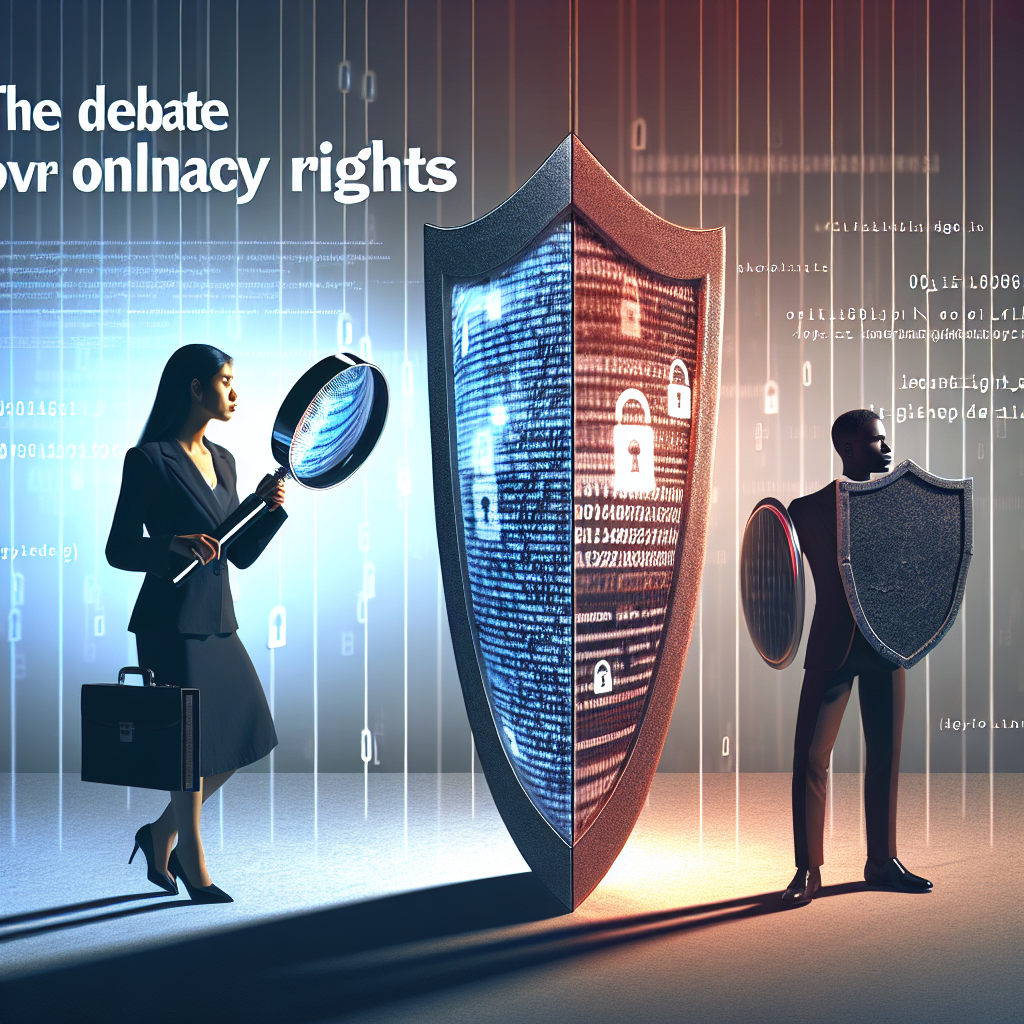In the age of digital technology, the debate over online privacy rights has become increasingly prominent. With the rapid advancement of the internet and social media platforms, individuals are sharing more personal information online than ever before. This has sparked a heated discussion regarding the balance between the convenience of online services and the protection of individual privacy. Should companies be allowed to collect and use our data for profit? How can we ensure that our personal information remains secure in the digital world? These questions are at the forefront of the ongoing debate over online privacy rights, shaping the future of technology and society as we know it.
Understanding Online Privacy Rights

In the digital age, the concept of online privacy rights has become increasingly significant due to the widespread use of the internet and digital technologies. Individuals are generating vast amounts of personal data through their online activities, leading to concerns about how this data is collected, stored, and used by various entities.
-
Definition of online privacy rights
Online privacy rights refer to the rights individuals have to control the collection, use, and dissemination of their personal information in the online environment. These rights encompass the ability to determine what data is collected about them, how it is used, and who has access to it. -
Importance of online privacy rights in the digital age
Online privacy rights are essential in safeguarding individuals’ autonomy, dignity, and freedom in the digital realm. As technology advances and data collection practices become more sophisticated, there is a growing need to protect individuals from potential privacy violations. Without robust online privacy rights, individuals risk having their personal information exploited for various purposes without their consent.
Historical Context of Online Privacy
The development of online privacy rights has been a complex and evolving process, influenced by various key events that have shaped the landscape of digital privacy. Understanding the historical context of online privacy is crucial in comprehending the current debates surrounding this issue.
- Evolution of online privacy rights:
- Online privacy rights can be traced back to the early days of the internet when individuals started to express concerns about the collection and use of their personal information online.
- The concept of privacy in the digital realm gained significance with the rise of e-commerce and social media platforms, where user data became a valuable commodity for businesses.
-
Over time, the evolution of technology, such as the proliferation of smartphones and the Internet of Things (IoT), has further complicated the landscape of online privacy rights.
-
Key events shaping the online privacy landscape:
- Enactment of Data Protection Laws: The introduction of data protection laws like the European Union’s General Data Protection Regulation (GDPR) in 2018 marked a significant milestone in safeguarding individuals’ online privacy rights.
- High-Profile Data Breaches: Major data breaches, such as the Facebook-Cambridge Analytica scandal in 2018, have underscored the vulnerability of personal data online and sparked debates about the ethical use of data by tech companies.
- Government Surveillance Programs: Revelations about government surveillance programs, as exposed by Edward Snowden in 2013, have raised concerns about mass surveillance and the erosion of online privacy rights.
By examining the historical context of online privacy, we can better understand the complexities and challenges associated with protecting individuals’ privacy in the digital age.

Legal Frameworks for Online Privacy
In today’s digital age, the issue of online privacy rights has become a crucial topic of debate. Various legal frameworks exist to address and regulate online privacy concerns, but the effectiveness and comprehensiveness of these frameworks can vary significantly between countries.
Overview of existing laws and regulations
-
United States: In the United States, online privacy rights are primarily governed by a patchwork of federal and state laws. The main federal laws that impact online privacy include the Electronic Communications Privacy Act (ECPA), the Children’s Online Privacy Protection Act (COPPA), and the Health Insurance Portability and Accountability Act (HIPAA). Additionally, individual states have enacted their own privacy laws, further complicating the regulatory landscape.
-
European Union: The European Union has taken a more unified approach to online privacy with the General Data Protection Regulation (GDPR). The GDPR sets strict standards for data protection and privacy rights for individuals within the EU, as well as regulating the transfer of personal data outside the EU. This regulation has had a significant impact on how businesses handle and protect user data.
-
Other countries: Countries like Canada, Australia, and Japan also have their own set of laws and regulations governing online privacy rights. These laws may vary in scope and stringency, but they all aim to protect the personal information of individuals online.
Discrepancies between countries in protecting online privacy rights
-
Enforcement: One of the key discrepancies between countries is the enforcement mechanisms for online privacy laws. Some countries have robust regulatory bodies that actively investigate and penalize violations, while others may have less stringent enforcement mechanisms in place.
-
Scope of protection: The scope of protection offered by online privacy laws can also vary between countries. Some jurisdictions may have broad definitions of personal information and strict requirements for data handling, while others may have more lenient standards.
-
International cooperation: Given the global nature of the internet, international cooperation on online privacy issues is crucial. However, discrepancies in legal frameworks and enforcement practices can hinder effective collaboration between countries in addressing cross-border privacy violations.
In conclusion, while there are existing legal frameworks for online privacy rights, the discrepancies between countries in terms of laws, enforcement, and scope of protection highlight the need for more comprehensive and harmonized approaches to safeguarding online privacy in the digital age.
GDPR and Its Impact
-
Explanation of GDPR
The General Data Protection Regulation (GDPR) is a comprehensive data privacy regulation implemented by the European Union to protect the personal data and privacy of individuals within the EU and the European Economic Area (EEA). It imposes strict rules on how businesses and organizations handle personal data, including requirements for consent, transparency, and data security. -
Effects of GDPR on online data protection
- Enhanced Data Protection: GDPR has significantly strengthened data protection measures by requiring companies to implement robust security measures to safeguard personal data from breaches and unauthorized access.
- Increased Transparency: Organizations are now obligated to provide clear information on how they collect, process, and store personal data, ensuring individuals have more control over their information.
- Consent Requirements: GDPR mandates that companies obtain explicit consent from individuals before collecting or processing their personal data, leading to a more transparent and user-centric approach to data handling.
- Accountability and Compliance: The regulation holds organizations accountable for data protection practices and requires them to demonstrate compliance through documentation, audits, and appointing Data Protection Officers.
- Global Impact: While GDPR is an EU regulation, its extraterritorial reach has influenced data protection laws worldwide, prompting many countries to adopt similar measures to enhance online privacy rights.
Overall, the impact of GDPR on online data protection has been substantial, setting a new standard for privacy regulations and emphasizing the importance of individual rights in the digital age.
Tech Companies’ Role in Online Privacy
In the digital age, tech companies play a pivotal role in shaping online privacy rights through their data collection practices and handling of user information. The extent to which tech giants collect and utilize personal data has sparked widespread debate regarding the ethical responsibilities these companies bear in safeguarding user privacy.
Data Collection Practices of Tech Giants
- Tech companies often employ sophisticated algorithms and tracking mechanisms to gather vast amounts of user data.
- Data collection may include personal information such as browsing history, location data, and even sensitive details shared on platforms.
- The sheer volume and granularity of data collected raise concerns about potential privacy breaches and unauthorized use of personal information.
- Some tech companies have faced criticism for opaque data collection practices that may not adequately inform users about the extent of information being gathered.
Debate Over the Ethical Responsibilities of Tech Companies in Safeguarding User Data
- There is ongoing discourse on the ethical obligations of tech companies to prioritize user privacy over commercial interests.
- Critics argue that tech giants have a moral duty to protect user data from exploitation and unauthorized access.
- Proponents of stringent privacy regulations advocate for increased transparency and accountability from tech companies in handling user information.
- Balancing the need for innovation and data-driven services with respect for user privacy remains a contentious issue in the ongoing debate over online privacy rights.
Encryption and Privacy
Encryption plays a crucial role in safeguarding online privacy by scrambling data to make it unreadable to unauthorized users. It serves as a protective shield against cyber threats and unauthorized access, ensuring that sensitive information remains secure in transit and at rest. The complexity of encryption algorithms makes it challenging for hackers to decipher encrypted data, thereby enhancing the overall security of online communications and transactions.
Importance of encryption in protecting online privacy
- Encryption safeguards personal information such as financial data, passwords, and private messages from being intercepted or compromised by malicious actors.
- By encrypting data, individuals can have greater control over their online activities and maintain a sense of privacy in an increasingly digital world.
- Encryption fosters trust between users and online platforms, as it demonstrates a commitment to data security and confidentiality.
Arguments for and against encryption backdoors
Arguments for encryption backdoors:
- Some law enforcement agencies argue that encryption backdoors would facilitate access to encrypted data during criminal investigations, aiding in the prevention and prosecution of illegal activities.
- Backdoors could potentially enhance national security by allowing authorities to monitor suspicious communications and detect potential threats in a timely manner.
Arguments against encryption backdoors:
- Introducing backdoors compromises the integrity of encryption systems, making them vulnerable to exploitation by cybercriminals and state-sponsored actors.
- Implementing backdoors undermines user trust in encryption technologies, as it raises concerns about government surveillance and potential abuse of power.
- Backdoors create ethical dilemmas regarding individual privacy rights and the balance between security and civil liberties.
Public Perception and Awareness
- Public attitudes towards online privacy
It is evident that public attitudes towards online privacy have significantly evolved in recent years. With the increasing frequency of data breaches and privacy scandals, individuals have become more cautious about the information they share online. Many people are now more aware of the potential risks associated with sharing personal data on various online platforms. However, despite this increased awareness, there is still a prevalent sense of resignation and helplessness among the public regarding their online privacy. Many individuals feel that their data is constantly being collected and utilized without their explicit consent, leading to a sense of distrust and skepticism towards online entities.
- Strategies to enhance public awareness of online privacy rights
In order to enhance public awareness of online privacy rights, it is crucial to implement educational campaigns that highlight the importance of safeguarding personal information in the digital age. These campaigns can focus on educating individuals about the various ways their data can be collected, processed, and potentially exploited by online companies. Additionally, providing clear and accessible information about privacy policies and data protection measures can empower users to make informed decisions about their online activities. Collaboration between government agencies, advocacy groups, and technology companies can also play a crucial role in raising awareness about online privacy rights and advocating for stronger data protection regulations. Efforts to enhance public awareness should be ongoing and adaptable to the evolving landscape of online privacy issues.
Balancing Privacy and Security
The debate over online privacy rights often centers around the delicate balance between safeguarding individual privacy and ensuring national security. This intricate interplay raises significant challenges and prompts discussions on how best to navigate these competing interests. Some key points to consider include:
- Challenges in balancing privacy rights with national security concerns:
- Government surveillance programs often encroach on individuals’ privacy rights in the name of national security.
- The collection and analysis of massive amounts of personal data raise concerns about potential abuses and infringements on civil liberties.
-
The rapid advancement of technology has outpaced legal and regulatory frameworks, creating a complex landscape for addressing privacy and security issues.
-
Proposed solutions to achieve a harmonious balance:
- Implementing robust data protection laws and regulations to govern the collection, storage, and use of personal information.
- Enhancing transparency and accountability mechanisms for government surveillance activities to ensure oversight and prevent abuses.
- Encouraging public dialogue and engagement to shape policies that strike a balance between privacy rights and security needs.

In essence, the challenge lies in finding a middle ground that upholds individuals’ right to privacy while also safeguarding against potential threats to national security. The ongoing debate underscores the need for thoughtful deliberation and comprehensive strategies to address the complex dynamics of online privacy rights in a digital age.
Future Trends in Online Privacy
As technology continues to advance at a rapid pace, the landscape of online privacy is constantly evolving. Several emerging technologies are significantly impacting online privacy, raising concerns and sparking debates about the future of individuals’ rights in the digital realm.
-
Internet of Things (IoT):
The proliferation of IoT devices, from smart home gadgets to wearable technology, poses significant challenges to online privacy. These interconnected devices collect vast amounts of personal data, raising questions about how this data is being used and protected. -
Artificial Intelligence (AI) and Machine Learning:
AI and machine learning algorithms are increasingly being utilized to analyze and interpret user data, leading to concerns about the potential for invasive surveillance and the manipulation of personal information for various purposes. -
Blockchain Technology:
While blockchain is known for its security features, its impact on online privacy is complex. While blockchain can enhance data security and enable greater control over personal information, it also raises questions about the permanence and immutability of data stored on the blockchain. -
Biometric Data and Facial Recognition:
The widespread use of biometric data and facial recognition technologies raises significant privacy concerns. The collection and analysis of biometric information for authentication and identification purposes can lead to potential privacy breaches and unauthorized access to sensitive data.
Predictions for the future of online privacy rights remain uncertain as technological advancements outpace regulatory frameworks and ethical considerations. As individuals navigate the digital landscape, the debate over online privacy rights continues to be a pressing issue that requires careful consideration and proactive measures to safeguard personal information in an increasingly interconnected world.
FAQs: The Debate Over Online Privacy Rights
What is the debate over online privacy rights?
The debate over online privacy rights revolves around the balance between individuals’ right to privacy and the collection and use of their personal data by companies and governments. On one side, there are concerns about the potential misuse of personal information, surveillance, and breaches of privacy. On the other side, there are arguments for the value of data collection for personalized services, targeted advertising, and national security purposes.
Why is online privacy rights important?
Online privacy rights are important because they protect individuals’ personal information from being abused, exploited, or misused. In the digital age, where our personal data is constantly being collected and shared, maintaining control over our online privacy is crucial for maintaining autonomy, protecting our identities, and safeguarding against potential harm or discrimination.
What are some current issues in the debate over online privacy rights?
Some current issues in the debate over online privacy rights include concerns about data breaches, lack of transparency in data collection practices, use of personal data for surveillance and tracking, challenges with consent and opt-out mechanisms, and the need for stronger regulation to protect individuals’ privacy rights in an increasingly connected and data-driven world.
How can individuals protect their online privacy rights?
Individuals can protect their online privacy rights by being mindful of the information they share online, using strong and unique passwords, enabling privacy settings on social media platforms, avoiding suspicious websites and links, regularly updating their software and security settings, using encryption tools, and being cautious about sharing sensitive personal information with third parties. Additionally, being informed about privacy policies and rights, advocating for stronger privacy regulations, and supporting privacy-enhancing technologies can help protect online privacy rights.


